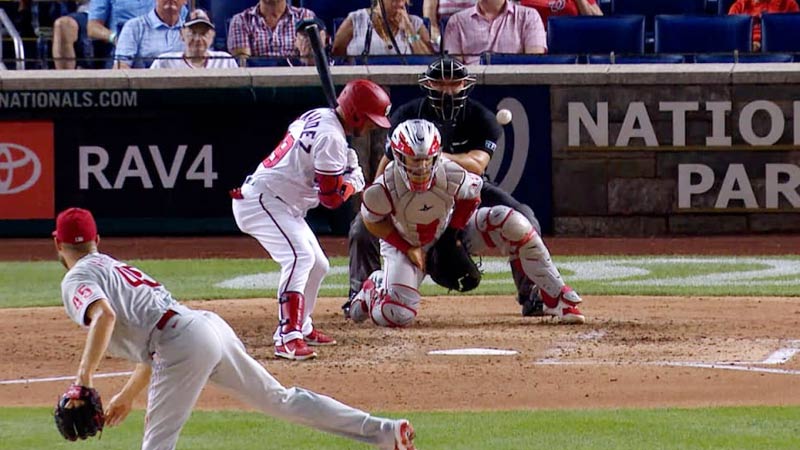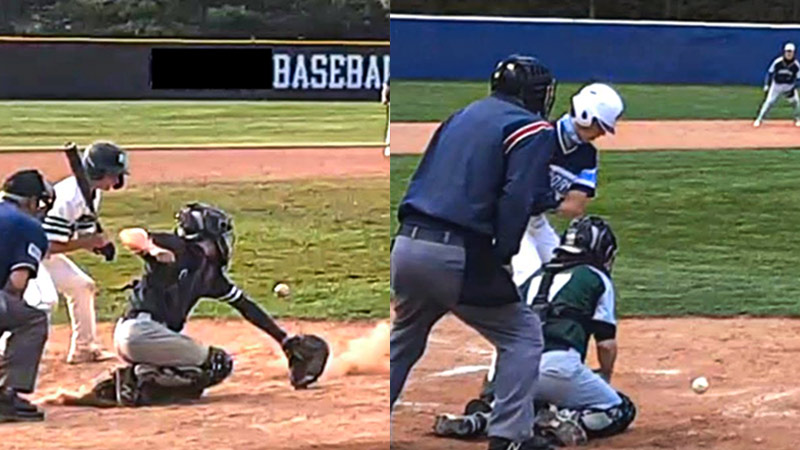In the game of baseball, both passed balls and wild pitches are terms used to describe situations where the ball eludes the catcher.
While they may seem similar, there are distinct differences between these two occurrences.
This article aims to delve into the nuances of passed balls and wild pitches, exploring their scoring methods, and impact on the game.
Also, we will discuss their implications for pitchers, catchers, and the overall outcome of a baseball game. Let’s get going into the article.
What Is the Passed Ball?
A passed ball is a specific event in baseball that occurs when the catcher fails to catch or control a pitch that should have been handled with ordinary effort. It can happen during any pitch, including a fastball, breaking ball, or changeup.
When a passed ball occurs, the ball gets past the catcher and moves away from its immediate reach, allowing baserunners to advance to the next base.
The Role of the Catcher
The catcher plays a vital defensive position in baseball, positioned behind home plate. Their primary responsibilities include receiving pitches from the pitcher, blocking pitches in the dirt, and controlling the running game by throwing out baserunners attempting to steal a base.
Catchers are expected to have good hand-eye coordination, quick reflexes, and the ability to handle a variety of pitch types.
Causes of a Passed Ball
Several factors can contribute to a passed ball, Check some of them out below.
Pitch Location
The location of the pitch can affect the difficulty of the catch for the catcher. Pitches that are thrown outside the strike zone or have significant movement can be more challenging to handle, increasing the chances of a passed ball.
Pitch Speed
High-velocity pitches can be difficult to catch cleanly, especially if the catcher is not able to anticipate and position themselves correctly to receive the ball.
Pitcher-Catcher Communication
Miscommunication between the pitcher and the catcher can lead to a passed ball. If the catcher expects a pitch in one location, but the pitcher throws it elsewhere, it can catch the catcher off guard, resulting in a missed catch.
Ball Movement
Pitches with excessive movement, such as a sharp breaking ball or a knuckleball, can be particularly challenging to catch, increasing the likelihood of a passed ball.
Consequences of a Passed Ball
When a passed ball occurs, the baserunners on the field have an opportunity to advance to the next base. This can lead to scoring opportunities, as runners may move into scoring position or attempt to steal an extra base.
Additionally, a passed ball can result in the pitcher losing confidence and potentially impacting their performance.
What Is the Wild Pitch?

Source: mlb.com
A wild pitch is a term commonly used in baseball to describe a pitch that is thrown by the pitcher with such inaccuracy or velocity that it becomes difficult for the catcher to handle, resulting in the ball getting past the catcher.
It is an important aspect of the game that can have significant consequences for both the pitching team and the opposing team.
Causes of a Wild Pitch
Many different factors can contribute to a wild pitch, Check some of them out below.
Inaccuracy
A wild pitch can occur when a pitcher fails to execute proper control over the ball, leading to the pitch missing the intended target. This can be due to mechanical flaws, loss of focus, or pressure situations that affect the pitcher’s command.
Velocity
Sometimes, a wild pitch can be a result of excessive velocity. When a pitcher throws at an extraordinarily high speed, it can be challenging for the catcher to react and make a clean catch, causing the ball to get past them.
Pitching Mechanics
Flaws in pitching mechanics, such as poor release points or inconsistent arm slots, can contribute to wild pitches. These mechanical issues can lead to inconsistent control and make it difficult for the pitcher to consistently hit their desired target.
Impact on the Game
Some of the common impacts of wild pitch on the game are mentioned in the following section.
Advancement of Runners
When a wild pitch occurs, runners on base have the opportunity to advance to the next base or even score runs. This can lead to significant changes in the game’s momentum and potentially alter the score.
Scoring Opportunities
A wild pitch can create scoring opportunities for the offensive team. If a runner is on third base and a wild pitch occurs, they may have a chance to sprint home and score a run.
Strategic Considerations
Coaches and managers often factor in the possibility of wild pitches when making strategic decisions.
They may choose to send a runner on a steal or attempt a squeeze play, taking advantage of the potential for a wild pitch to generate scoring opportunities.
Differences between Passed Ball and Wild Pitch
While both passed balls and wild pitches involve the ball eluding the catcher, there are several key differences between the two:
Scoring Methods
Passed balls and wild pitches are scored differently. A passed ball is charged against the catcher, affecting his statistics, while a wild pitch is charged against the pitcher, impacting his performance.
This difference in scoring allows for a clear distinction between the responsibility of the catcher and the pitcher in the play.
Empty Bases
In the case of a passed ball, baserunners can advance to the next base if they choose to do so, regardless of the number of outs in the inning.
However, in the event of a wild pitch, baserunners are not allowed to advance to the next base unless there are already two outs in the inning.
This distinction in baserunner advancement rules between passed balls and wild pitches can affect strategic decisions made by both teams during the game.
Avoiding Method
A passed ball is typically the result of a catcher’s mistake in failing to catch or control a pitch that should have been caught. It signifies a lapse in the catcher’s ability to handle the ball effectively.
On the other hand, a wild pitch occurs when the pitcher throws a pitch that is too difficult for the catcher to handle, often due to its erratic nature. A wild pitch reflects the pitcher’s inability to deliver an accurate or manageable pitch rather than a mistake on the catcher’s part.
Error
A passed ball is considered an error on the catcher’s part, reflecting a defensive miscue. It is recorded as an error in the official statistics, potentially impacting the catcher’s fielding percentage.
On the other hand, a wild pitch is not considered an error on the pitcher’s part. It is seen as an inherent risk associated with the nature of the pitch and is not attributed as an error in the statistics.
In the Perfect Game
In the rare occurrence of a perfect game, where a pitcher retires every batter without allowing any baserunners, a passed ball would nullify the perfection. If a passed ball allows a baserunner to reach, the perfect game is no longer intact.
However, a wild pitch would not affect the pitcher’s perfect game status since it is not considered an error or a direct fault of the pitcher.
FAQs
Can a wild pitch or passed ball result in a run being scored?
Yes, both a wild pitch and a passed ball can allow baserunners to advance, potentially resulting in a run being scored if the baserunner reaches home plate before the ball is retrieved.
Is a passed ball or a wild pitch more common in baseball?
The frequency of passed balls and wild pitches can vary depending on the teams and individual performances. However, in general, passed balls tend to occur more frequently than wild pitches.
Who determines whether a play is a passed ball or a wild pitch?
The official scorer of the game is responsible for determining whether a play should be scored as a passed ball or a wild pitch based on the specific circumstances and rules defined by the league.
Can a catcher be penalized for multiple passed balls or wild pitches in a game?
While there are no specific penalties imposed on a catcher for multiple passed balls or wild pitches, a catcher’s defensive skills and performance may be evaluated by the coaching staff or team management.
Do pass balls and wild pitches affect a pitcher’s earned run average (ERA)?
Yes, both passed balls and wild pitches can impact a pitcher’s ERA. Runs scored as a result of passed balls or wild pitches are considered earned runs and are factored into the calculation of the pitcher’s ERA.
End Call
So, passed balls and wild pitches may appear similar on the surface, but they have distinct differences in terms of scoring, responsibility, and impact on the game.
These differences are crucial for players, coaches, and fans to accurately assess the performance of catchers and pitchers, as well as the overall dynamics of a baseball game.
Both passed balls and wild pitches contribute to the excitement and unpredictability of America’s favorite pastime. Thank you for your support.







